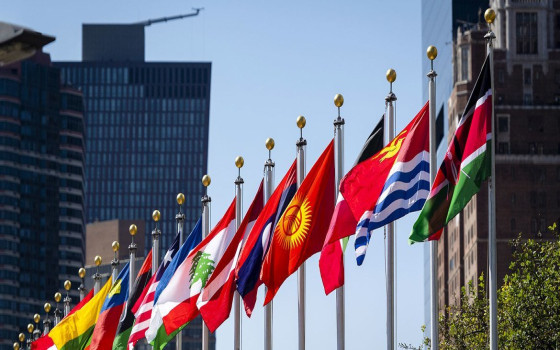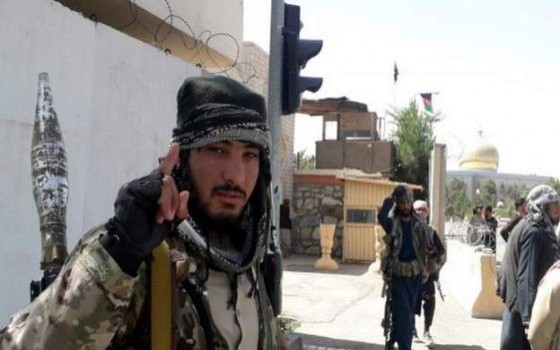
الأمم المتحدة: 2023 من أكثر الأعوام دموية في تاريخ الصراع، والحرب الراهنة تذكرة بأهمية تحقيق حل الدولتين

- Europe and Arabs
- الأربعاء , 20 ديسمبر 2023 15:7 م GMT
قال تور وينسلاند منسق الأمم المتحدة لعملية السلام في الشرق الأوسط إن الحرب الدائرة في غزة وإسرائيل هي تذكرة مأساوية بعدم وجود بديل للعملية السياسية المشروعة التي يمكن أن تحل القضايا الجوهرية للصراع. وقال إن عام 2023 من أكثر الأعوام دموية في تاريخ الصراع الفلسطيني الإسرائيلي، فيما يتواصل تدهور الوضع على جميع الأصعدة.
شدد وينسلاند على أهمية تمكين الأطراف، في هذا المنعطف الدقيق، من إعادة التواصل على المسار السياسي الذي يقود إلى تحقيق حل الدولتين. وقال إن أعمال العنف التي وقعت منذ 7 تشرين الأول/أكتوبر في إسرائيل والأرض الفلسطينية المحتلة، وخاصة قطاع غزة، قد صدم المنطقة والأكثر من ذلك حياة ملايين الفلسطينيين والإسرائيليين.
جاء ذلك في جلسة عقدها مجلس الأمن الدولي حول الوضع في الشرق الأوسط، بما فيه القضية الفلسطينية استمع خلالها- عبر دائرة اتصال بالفيديو من القدس- إلى إحاطة من المنسق الأممي تور وينسلاند، والميجور جنرال باتريك غوتشات رئيس هيئة الأمم المتحدة لمراقبة الهدنة.
"تقارير عن عنف جنسي"
جدد تور وينسلاند إدانته "للهجمات المسلحة المروعة التي شنتها حماس وآخرون في إسرائيل". وقال إن شيئا لا يمكن أن يبرر الأعمال الإرهابية التي ارتكبت وتعمد قتل وتشويه واختطاف المدنيين. وأعرب عن فزعه إزاء "تقارير وقوع أعمال عنف جنسي أثناء الهجمات"، مشددا على ضرورة التحقيق في تلك الأعمال ومقاضاة الجناة. وأضاف أن الإطلاق العشوائي للصواريخ باتجاه المراكز السكنية الإسرائيلية هو انتهاك للقانون الدولي الإنساني ويجب أن يتوقف على الفور.
"قتل ودمار غير مسبوقين في غزة"
وقال المنسق الأممي لعملية السلام في الشرق الأوسط إن حجم الأعمال القتالية بين إسرائيل وحماس ونطاق القتل والتدمير في غزة، "غير مسبوقين ويصعب تحملهما". وأدان بشكل قاطع قتل المدنيين في غزة، بمن فيهم النساء والأطفال. وأعرب عن حزنه لمصرع "كل فرد من المدنيين، ومنهم 131 زميلا في الأمم المتحدة". وأشار إلى أن ذلك يمثل أكبر خسارة بشرية من نوعها في تاريخ الأمم المتحدة.
كما أبدى قلقه بشأن تأثير الأعمال القتالية الدائرة على الوضع الإنساني في غزة. وقال إن الوضع الحالي يجعل من المستحيل القيام بالعمليات الإنسانية ذات المغزى.
تصاعد التوتر في الضفة الغربية
أعرب تور وينسلاند عن القلق أيضا بشأن تصاعد التوترات في الضفة الغربية المحتلة، بما فيها القدس الشرقية. وجدد التأكيد على ضرورة أن تلتزم قوات الأمن بأقصى درجات ضبط النفس وألا تستخدم القوة الفتاكة إلا في الحالات التي لا يمكن تجنبها من أجل حماية الحياة.
وأبدى قلقه بشأن الهجمات المميتة التي يشنها مستوطنون إسرائيليون ضد فلسطينيين، وفلسطينيون ضد إسرائيليين في الضفة الغربية المحتلة وإٍسرائيل. وشدد على ضرورة محاسبة جميع مرتكبي أعمال العنف وتقديمهم بشكل عاجل للعدالة.
توسع مستمر للمستوطنات
وأعرب منسق عملية السلام في الشرق الأوسط عن قلقه البالغ بشأن التوسيع المستمر للمستوطنات الإسرائيلية في الضفة الغربية المحتلة بما فيها القدس الشرقية، بما يعيق وصول الفلسطينيين لأراضيهم ومواردهم ويهدد إمكانية قيام دولة فلسطينية مستقلة في المستقبل.
وجدد التأكيد على أن المستوطنات الإسرائيلية تمثل انتهاكا صارخا لقرارات الأمم المتحدة والقانون الدولي. ودعا الحكومة الإسرائيلية لوقف تلك الأنشطة على الفور.
وأكد تور وينسلاند التزام الأمم المتحدة بدعم الفلسطينيين والإسرائيليين لإنهاء الاحتلال وحل الصراع بما يتوافق مع القانون الدولي وقرارات الأمم المتحدة ذات الصلة والاتفاقات الثنائية سعيا لوجود دولتين: إسرائيل ودولة فلسطين المستقلة الديمقراطية القادرة على الاستمرار وذات السيادة- التي تكون غزة جزءا لا يتجزأ منها- تعيشان جنبا إلى جنب في سلام وأمن في حدود آمنة ومعترف بها على أساس خطوط عام 1967، وأن تكون القدس عاصمة للدولتين.
هيئة مراقبة الهدنة
يذكر أن هيئة مراقبة الهدنة هي أول بعثات الأمم المتحدة لحفظ السلام، وقد تأسست في أيار/مايو عام 1948 عندما دعا مجلس الأمن إلى وقف الأعمال العدائية في فلسطين في قراره رقم 50. ومنذ ذلك الوقت استمر وجود مراقبي البعثة العسكريين في الشرق الأوسط لمراقبة وقف إطلاق النار والإشراف على اتفاقيات الهدنة التي وقعت بين إسرائيل ومصر والأردن ولبنان وسوريا ومنع الحوادث المنفردة من التصاعد.
قال الميجور جنرال باتريك غوتشات رئيس هيئة الأمم المتحدة لمراقبة الهدنة إن أحداث السابع من تشرين الأول/أكتوبر أثرت على عمليات البعثة والديناميات الإقليمية. وأشار إلى وقوع الكثير من انتهاكات وقف إطلاق النار منذ الثامن من تشرين الأول/أكتوبر عبر الخط الأزرق بين إسرائيل ولبنان وفي الجولان بين إسرائيل وسوريا.
وقال إن المراقبين العسكريين للبعثة اتخذوا واعتمدوا التدابير الأمنية الملائمة فيما يواصلون دورهم المهم في ضمان المراقبة العسكرية الدقيقة والتحقيق في انتهاكات وقف إطلاق النار والتفتيش في الجولان وتقديم التقارير لتعزيز الاتصال بين الأطراف بما في ذلك من أجل تهدئة التصعيد.
وتطرق إلى زياراته واتصالاته مع الأطراف المعنية منذ بداية الأحداث الراهنة. على سبيل المثال بشأن الخط الأزرق قال إن المسؤولين من كل من لبنان وإسرائيل أخبروه باستعدادهم لتحسين الأمن وتطبيق قرار مجلس الأمن رقم 1701. وحول الجولان، أعربت له كل من إسرائيل وسوريا عن إرادتهما القوية للإبقاء على الهدنة، كما شاطرا معه مخاوفهما وتوقعاتهما.
وقال إن السلطات المعنية، خلال زياراته، شاطرت معه وجهات نظرها بشأن الوضع الإقليمي وحول وقف إطلاق النار. وأضاف أنه أثناء هذه المناقشات، حاول دائما نزع فتيل المواقف المحتمل أن تكون خطرة والتأكيد للأطراف بأنه سينقل رسائلها للأطراف الأخرى.
وأضاف في ختام كلمته: "فيما يتطور الوضع الإقليمي، سنواصل المساهمة باتجاه الحل الشامل والعادل والسلمي للوضع في الشرق الأوسط"












لا يوجد تعليقات